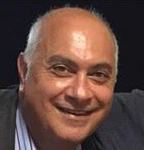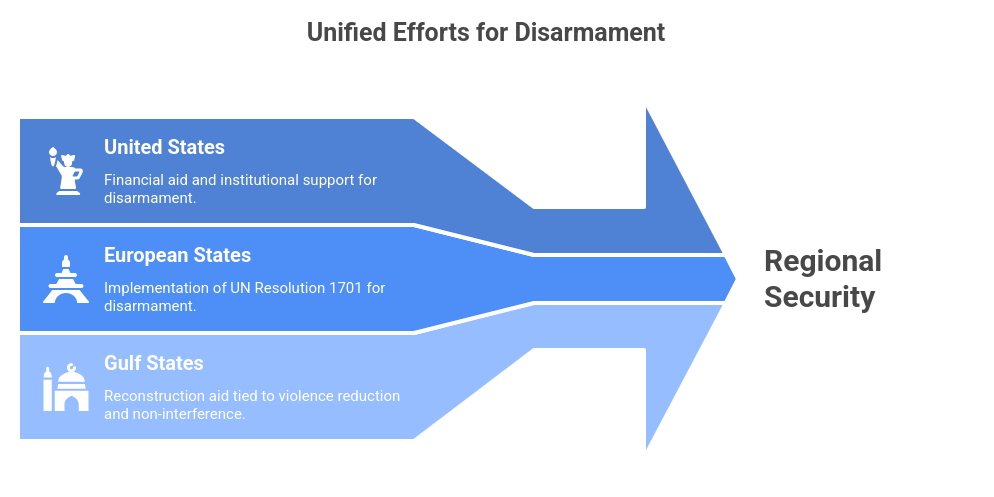The Politics of Hezbollah’s Disarmament:
Why the World Supports It, Lebanon Is Polarized, and Tehran and Israel’s Right Resist It By Sergio Jalil – November 12, 2025
By Sergio Jalil – November 12, 2025
Hezbollah’s disarmament remains one of the most complex and divisive issues shaping Lebanon’s political landscape and the broader Middle East. It is far more than a question of internal sovereignty—it stands as a proxy battlefield reflecting regional rivalries, particularly between Iran’s leadership and Israel’s right-wing establishment.
International Support for Disarmament
A broad coalition of international actors—including the United States, France, Germany, Saudi Arabia, and the United Arab Emirates—supports Hezbollah’s disarmament. Their shared premise is straightforward: consolidating all arms under the Lebanese state is essential for restoring sovereignty, stability, and economic recovery.
The United States links disarmament to major financial assistance and institutional strengthening. European states emphasize implementing UN Resolution 1701, which requires ending the autonomy of militias and ensuring the state holds a monopoly over legitimate force. Gulf states have tied reconstruction aid to measurable progress in reducing violence and limiting external interference.
These actors back a phased Lebanese Armed Forces plan to dismantle Hezbollah’s arsenal, reduce Iranian influence, and prevent future conflict with Israel. They view this process as a prerequisite for a lasting ceasefire along the southern border and enhanced regional security.

Lebanon’s Internal Divide
Within Lebanon, disarmament splits society across political and sectarian lines. Reformist movements and many Christian, Druze, and Sunni parties see it as essential for restoring the authority of the Lebanese state.
Hezbollah and the Amal Movement take the opposite position. They argue that Hezbollah’s weapons remain necessary to deter Israeli aggression and that disarmament cannot occur while disputed territories remain unresolved. This stance—often backed by warnings of potential civil conflict—highlights Lebanon’s fragile internal equilibrium. Iran’s sustained military, financial, and ideological support reinforces Hezbollah’s resistance to compromise.
Why Iran Resists Disarmament
For Tehran, Hezbollah is a strategic extension of Iranian influence rather than a purely Lebanese actor. Disarming the group would weaken Iran’s regional deterrence, reduce leverage in negotiations, and shrink its influence in Lebanon.
Hezbollah provides Iran with operational reach and plausible deniability. It serves both as a domestic power player in Lebanon and as a regional deterrent force that projects Iranian interests.
Israel’s Right-Wing Paradox
Although Israel’s right-wing leadership officially supports disarmament, the political reality is more complex. Hezbollah’s continued militarization reinforces Israel’s security doctrine and justifies sustained defence spending.
The ongoing threat limits space for peace negotiations and reinforces hardline positions that frame territorial concessions as enabling Iranian expansion. Hezbollah, in turn, uses this posture to sustain its own “resistance” narrative.
The Paradox of Mutual Benefit
Hezbollah’s armed status benefits two opposing camps: Iran and Israel’s right-wing factions. Each uses the current balance to reinforce its strategic narrative. For both sides, tension is more beneficial than peace—leaving Lebanon’s sovereignty trapped between external interests and internal paralysis.
Lebanon’s Leadership and the Implementation Challenge
President Joseph Aoun faces growing pressure over the pace of disarmament. His administration maintains that the state must hold exclusive authority over weapons but has adopted an incremental approach to avoid destabilizing the country.
While Aoun claims progress south of the Litani River, many critics argue that the slow pace risks missing a rare geopolitical opening. Israeli officials accuse Aoun of hesitancy. Aoun counters that progress depends on Israel halting border violations and withdrawing from remaining occupied territories.
International partners recognize the immense difficulty of disarming an embedded militia without triggering conflict. Aoun’s caution reflects both Lebanon’s sectarian complexity and the ever-present threat of internal instability.
A Path Forward
Hezbollah’s disarmament sits at the crossroads of Lebanon’s sovereignty and the Middle East’s evolving geopolitical landscape. The process is tangled in competing interests, ideological battles, and strategic dependencies.
Real progress will depend on patient diplomacy, coherent domestic political leadership, and sustained international coordination—carefully calibrated to avoid inflaming Lebanon’s delicate internal balance.
Until regional incentives shift or a broader diplomatic architecture emerges, Hezbollah’s armed status will continue to define Lebanon’s fragile equilibrium and shape regional dynamics.
Also published @ https://independentdiaspora.org/3242/
